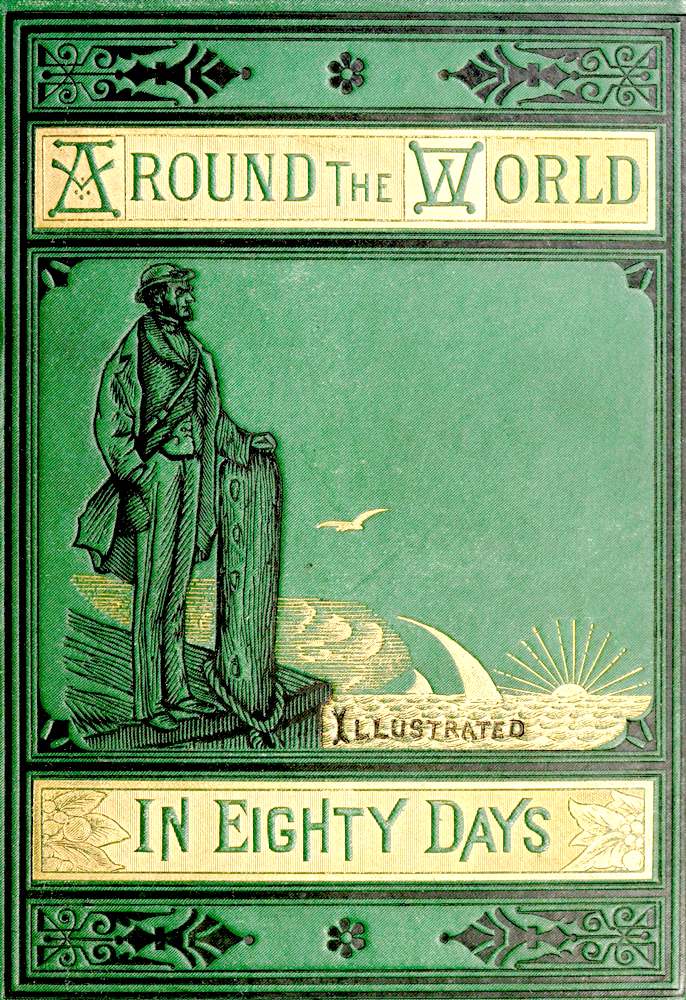|
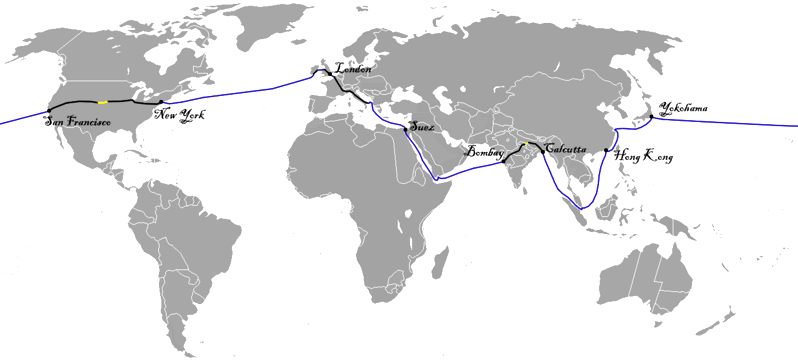
Map
of the route taken by Phileas Fogg, starting in London, then proceeding
east to Suez, Bombay, Calcutta, Hong Kong , Yokohama, San Francisco, New
York, and across the Atlantic
ocean to Ireland, then Liverpool England, and back to London. The route
planner below is for a circumnavigation on water in under 80 days, using
hydrogen, as per the author's prediction in The Mysterious Island. It
would be a major achievement if this was arranged to honor the 150th
anniversary of his publication.
CHAPTER
XVII.
SHOWING WHAT HAPPENED ON THE VOYAGE FROM SINGAPORE TO HONG KONG
The detective and Passepartout met often on deck after this interview, though Fix was reserved, and did not attempt to induce his companion to divulge any more facts concerning Mr. Fogg. He caught a glimpse of that mysterious gentleman once or twice; but Mr. Fogg usually confined himself to the cabin, where he kept Aouda company, or, according to his inveterate habit, took a hand at whist.
Passepartout began very seriously to conjecture what strange chance kept Fix still on the route that his master was pursuing. It was really worth considering why this certainly very amiable and complacent person, whom he had first met at Suez, had then encountered on board the “Mongolia,” who disembarked at Bombay, which he announced as his destination, and now turned up so unexpectedly on the “Rangoon,” was following Mr. Fogg’s tracks step by step. What was Fix’s object?
Passepartout was ready to wager his Indian shoes—which he religiously preserved—that Fix would also leave Hong Kong at the same time with them, and probably on the same steamer.
Passepartout might have cudgelled his brain for a century without hitting upon the real object which the detective had in view. He never could have imagined that Phileas Fogg was being tracked as a robber around the globe. But, as it is in human nature to attempt the solution of every mystery, Passepartout suddenly discovered an explanation of Fix’s movements, which was in truth far from unreasonable. Fix, he thought, could only be an agent of Mr. Fogg’s friends at the Reform Club, sent to follow him up, and to ascertain that he really went round the world as had been agreed upon.
“It’s clear!” repeated the worthy servant to himself, proud of his shrewdness. “He’s a spy sent to keep us in view! That isn’t quite the thing, either, to be spying Mr. Fogg, who is so honourable a man! Ah, gentlemen of the Reform, this shall cost you dear!”
Passepartout, enchanted with his discovery, resolved to say nothing to his master, lest he should be justly offended at this mistrust on the part of his adversaries. But he determined to chaff Fix, when he had the chance, with mysterious allusions, which, however, need not betray his real suspicions.
During the afternoon of Wednesday, 30th October, the “Rangoon” entered the Strait of Malacca, which separates the peninsula of that name from Sumatra. The mountainous and craggy islets intercepted the beauties of this noble island from the view of the travellers. The “Rangoon” weighed anchor at Singapore the next day at four a.m., to receive coal, having gained half a day on the prescribed time of her arrival. Phileas Fogg noted this gain in his journal, and then, accompanied by Aouda, who betrayed a desire for a walk on shore, disembarked.
Fix, who suspected Mr. Fogg’s every movement, followed them cautiously, without being himself perceived; while Passepartout, laughing in his sleeve at Fix’s manœuvres, went about his usual errands.
The island of Singapore is not imposing in aspect, for there are no mountains; yet its appearance is not without attractions. It is a park checkered by pleasant highways and avenues. A handsome carriage, drawn by a sleek pair of New Holland horses, carried Phileas Fogg and Aouda into the midst of rows of palms with brilliant foliage, and of clove-trees, whereof the cloves form the heart of a half-open flower. Pepper plants replaced the prickly hedges of European fields; sago-bushes, large ferns with gorgeous branches, varied the aspect of this tropical clime; while nutmeg-trees in full foliage filled the air with a penetrating perfume. Agile and grinning bands of monkeys skipped about in the trees, nor were tigers wanting in the jungles.
After a drive of two hours through the country, Aouda and Mr. Fogg returned to the town, which is a vast collection of heavy-looking, irregular houses, surrounded by charming gardens rich in tropical fruits and plants; and at ten o’clock they re-embarked, closely followed by the detective, who had kept them constantly in sight.
Passepartout, who had been purchasing several dozen mangoes—a fruit as large as good-sized apples, of a dark-brown colour outside and a bright red within, and whose white pulp, melting in the mouth, affords gourmands a delicious sensation—was waiting for them on deck. He was only too glad to offer some mangoes to Aouda, who thanked him very gracefully for them.
At eleven o’clock the “Rangoon” rode out of Singapore harbour, and in a few hours the high mountains of Malacca, with their forests, inhabited by the most beautifully-furred tigers in the world, were lost to view. Singapore is distant some thirteen hundred miles from the island of Hong Kong, which is a little English colony near the Chinese coast. Phileas Fogg hoped to accomplish the journey in six days, so as to be in time for the steamer which would leave on the 6th of November for Yokohama, the principal Japanese port.
The “Rangoon” had a large quota of passengers, many of whom disembarked at Singapore, among them a number of Indians, Ceylonese, Chinamen, Malays, and Portuguese, mostly second-class travellers.
The weather, which had hitherto been fine, changed with the last quarter of the moon. The sea rolled heavily, and the wind at intervals rose almost to a storm, but happily blew from the south-west, and thus aided the steamer’s progress. The captain as often as possible put up his sails, and under the double action of steam and sail the vessel made rapid progress along the coasts of Anam and Cochin China. Owing to the defective construction of the “Rangoon,” however, unusual precautions became necessary in unfavourable weather; but the loss of time which resulted from this cause, while it nearly drove Passepartout out of his senses, did not seem to affect his master in the least. Passepartout blamed the captain, the engineer, and the crew, and consigned all who were connected with the ship to the land where the pepper grows. Perhaps the thought of the gas, which was remorselessly burning at his expense in Saville Row, had something to do with his hot impatience.
“You are in a great hurry, then,” said Fix to him one day, “to reach Hong Kong?”
“A very great hurry!”
“Mr. Fogg, I suppose, is anxious to catch the steamer for Yokohama?”
“Terribly anxious.”
“You believe in this journey around the world, then?”
“Absolutely. Don’t you, Mr. Fix?”
“I? I don’t believe a word of it.”
“You’re a sly dog!” said Passepartout, winking at him.
This expression rather disturbed Fix, without his knowing why. Had the Frenchman guessed his real purpose? He knew not what to think. But how could Passepartout have discovered that he was a detective? Yet, in speaking as he did, the man evidently meant more than he expressed.
Passepartout went still further the next day; he could not hold his tongue.
“Mr. Fix,” said he, in a bantering tone, “shall we be so unfortunate as to lose you when we get to Hong Kong?”
“Why,” responded Fix, a little embarrassed, “I don’t know; perhaps—”
“Ah, if you would only go on with us! An agent of the Peninsular Company, you know, can’t stop on the way! You were only going to Bombay, and here you are in China. America is not far off, and from America to Europe is only a step.”
Fix looked intently at his companion, whose countenance was as serene as possible, and laughed with him. But Passepartout persisted in chaffing him by asking him if he made much by his present occupation.
“Yes, and no,” returned Fix; “there is good and bad luck in such things. But you must understand that I don’t travel at my own expense.”
“Oh, I am quite sure of that!” cried Passepartout, laughing heartily.
Fix, fairly puzzled, descended to his cabin and gave himself up to his reflections. He was evidently suspected; somehow or other the Frenchman had found out that he was a detective. But had he told his master? What part was he playing in all this: was he an accomplice or not? Was the game, then, up? Fix spent several hours turning these things over in his mind, sometimes thinking that all was lost, then persuading himself that Fogg was ignorant of his presence, and then undecided what course it was best to take.
Nevertheless, he preserved his coolness of mind, and at last resolved to deal plainly with Passepartout. If he did not find it practicable to arrest Fogg at Hong Kong, and if Fogg made preparations to leave that last foothold of English territory, he, Fix, would tell Passepartout all. Either the servant was the accomplice of his master, and in this case the master knew of his operations, and he should fail; or else the servant knew nothing about the robbery, and then his interest would be to abandon the robber.
Such was the situation between Fix and Passepartout. Meanwhile Phileas Fogg moved about above them in the most majestic and unconscious indifference. He was passing methodically in his orbit around the world, regardless of the lesser stars which gravitated around him. Yet there was near by what the astronomers would call a disturbing star, which might have produced an agitation in this gentleman’s heart. But no! the charms of Aouda failed to act, to Passepartout’s great surprise; and the disturbances, if they existed, would have been more difficult to calculate than those of Uranus which led to the discovery of Neptune.
It was every day an increasing wonder to Passepartout, who read in Aouda’s eyes the depths of her gratitude to his master.
Phileas Fogg, though brave and gallant, must be, he thought, quite heartless. As to the sentiment which this journey might have awakened in him, there was clearly no trace of such a thing; while poor Passepartout existed in perpetual reveries.
One day he was leaning on the railing of the engine-room, and was observing the engine, when a sudden pitch of the steamer threw the screw out of the
water. The steam came hissing out of the valves; and this made Passepartout indignant.
“The valves are not sufficiently charged!” he exclaimed. “We are not going. Oh, these English! If this was an American craft, we should blow up, perhaps, but we should at all events go faster!”
CHAPTERS
1. - I. IN WHICH PHILEAS FOGG AND PASSEPARTOUT ACCEPT EACH OTHER, THE ONE AS
MASTER AND AS MAN
2. - II. IN WHICH PASSEPARTOUT IS CONVINCED THAT HE HAS AT LAST FOUND HIS IDEAL
3. - III. IN WHICH A CONVERSATION TAKES PLACE WHICH SEEMS LIKELY TO COST PHILEAS FOGG DEAR
4. - IV. IN WHICH PHILEAS FOGG ASTOUNDS
PASSEPARTOUT, HIS SERVANT
5. - V. IN WHICH A NEW SPECIES OF FUNDS, UNKNOWN TO THE MONEYED MEN, APPEARS ON ’CHANGE
6. - VI. IN WHICH FIX, THE DETECTIVE, BETRAYS A VERY NATURAL IMPATIENCE
7. - VII. WHICH ONCE MORE DEMONSTRATES THE USELESSNESS OF PASSPORTS AS AIDS TO DETECTIVES
8. - VIII. IN WHICH PASSEPARTOUT TALKS RATHER MORE, PERHAPS, THAN IS PRUDENT
9. - IX. IN WHICH THE RED SEA AND THE INDIAN OCEAN PROVE PROPITIOUS TO THE DESIGNS OF PHILEAS FOGG
10. - X. IN WHICH PASSEPARTOUT IS ONLY TOO GLAD TO GET OFF WITH THE LOSS OF HIS SHOES
11. - XI. IN WHICH PHILEAS FOGG SECURES A CURIOUS MEANS OF CONVEYANCE AT A FABULOUS PRICE
12. - XII. IN WHICH PHILEAS FOGG AND HIS COMPANIONS VENTURE ACROSS THE INDIAN FORESTS, AND WHAT ENSUED
13. - XIII. IN WHICH PASSEPARTOUT RECEIVES A NEW PROOF THAT FORTUNE FAVORS THE BRAVE
14. - XIV. FOGG DESCENDS THE LENGTH OF THE BEAUTIFUL VALLEY OF THE GANGES WITHOUT EVER THINKING OF SEEING IT
15. - XV. IN WHICH THE BAG OF BANKNOTES DISGORGES SOME THOUSANDS OF POUNDS MORE
16. - XVI. IN WHICH FIX DOES NOT SEEM TO UNDERSTAND IN THE LEAST WHAT IS SAID TO HIM
17. - XVII. SHOWING WHAT HAPPENED ON THE VOYAGE FROM SINGAPORE TO HONG KONG
18. - XVIII. IN WHICH PHILEAS FOGG, PASSEPARTOUT, AND FIX GO EACH ABOUT HIS BUSINESS
19. - XIX. IN WHICH PASSEPARTOUT TAKES A TOO GREAT INTEREST IN HIS MASTER, AND WHAT COMES OF IT
20. - XX. IN WHICH FIX COMES FACE TO FACE WITH PHILEAS FOGG
21. - XXI. IN WHICH THE MASTER OF THE “TANKADERE” RUNS GREAT RISK OF LOSING A REWARD OF TWO HUNDRED POUNDS
22. - XXII. PASSEPARTOUT DISCOVERS IT IS CONVENIENT TO HAVE MONEY IN ONE’S POCKET
AT THE ANTIPODES
23. - XXIII. IN WHICH PASSEPARTOUT’S NOSE BECOMES OUTRAGEOUSLY LONG
24. - XXIV. DURING WHICH MR. FOGG AND PARTY CROSS THE PACIFIC OCEAN
25. - XXV. IN WHICH A SLIGHT GLIMPSE IS HAD OF SAN FRANCISCO
26. - XXVI. IN WHICH PHILEAS FOGG AND PARTY TRAVEL BY THE PACIFIC RAILROAD
27. - XXVII. IN WHICH PASSEPARTOUT UNDERGOES, AT A SPEED OF 20 MPH, A COURSE OF MORMON HISTORY
28. - XXVIII. IN WHICH PASSEPARTOUT DOES NOT SUCCEED IN MAKING ANYBODY LISTEN TO REASON
29. - XXIX. IN WHICH CERTAIN INCIDENTS ARE NARRATED WHICH ARE ONLY TO BE MET WITH ON AMERICAN RAILROADS
30. - XXX. IN WHICH PHILEAS FOGG SIMPLY DOES HIS DUTY
31. - XXXI. IN WHICH FIX, THE DETECTIVE, CONSIDERABLY FURTHERS THE INTERESTS OF PHILEAS FOGG
32. - XXXII. IN WHICH PHILEAS FOGG ENGAGES IN A DIRECT STRUGGLE WITH BAD FORTUNE
33. - XXXIII. IN WHICH PHILEAS FOGG SHOWS HIMSELF EQUAL TO THE OCCASION
34. - XXXIV. IN WHICH PHILEAS FOGG AT LAST REACHES LONDON
35. - XXXV. IN WHICH PHILEAS FOGG DOES NOT HAVE TO REPEAT HIS ORDERS TO PASSEPARTOUT TWICE
36. - XXXVI. IN WHICH PHILEAS FOGG’S NAME IS ONCE MORE AT A PREMIUM ON ’CHANGE
37. - XXXVII. PHILEAS FOGG FINDS HE GAINED NOTHING BY HIS TOUR AROUND THE WORLD, UNLESS IT WERE HAPPINESS
PLOT
- AROUND
THE WORLD IN EIGHTY DAYS
The story starts in London on October 2, 1872. Phileas Fogg is a wealthy, solitary, unmarried gentleman with regular habits. The source of his wealth is not known and he lives modestly. He fires his former valet, James Forster, for bringing him shaving
water two degrees too cold. He hires as a replacement
Passepartout, a Frenchman of around 30 years of age.
Later that day in the Reform Club, he gets involved in an argument over an article in
The Daily
Telegraph, stating that with the opening of a new railway section in India, it is now possible to travel around the world in 80 days.
Fogg accepts a wager for £20,000 from his fellow club members, which he will receive if he makes it around the world in 80 days. Accompanied by his manservant
Passepartout, he leaves London by train at 8.45 p.m. on October 2, 1872, and thus is due back at the Reform Club at the same time 80 days later, on December 21.
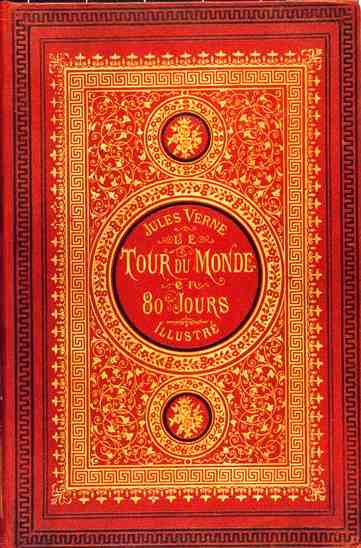
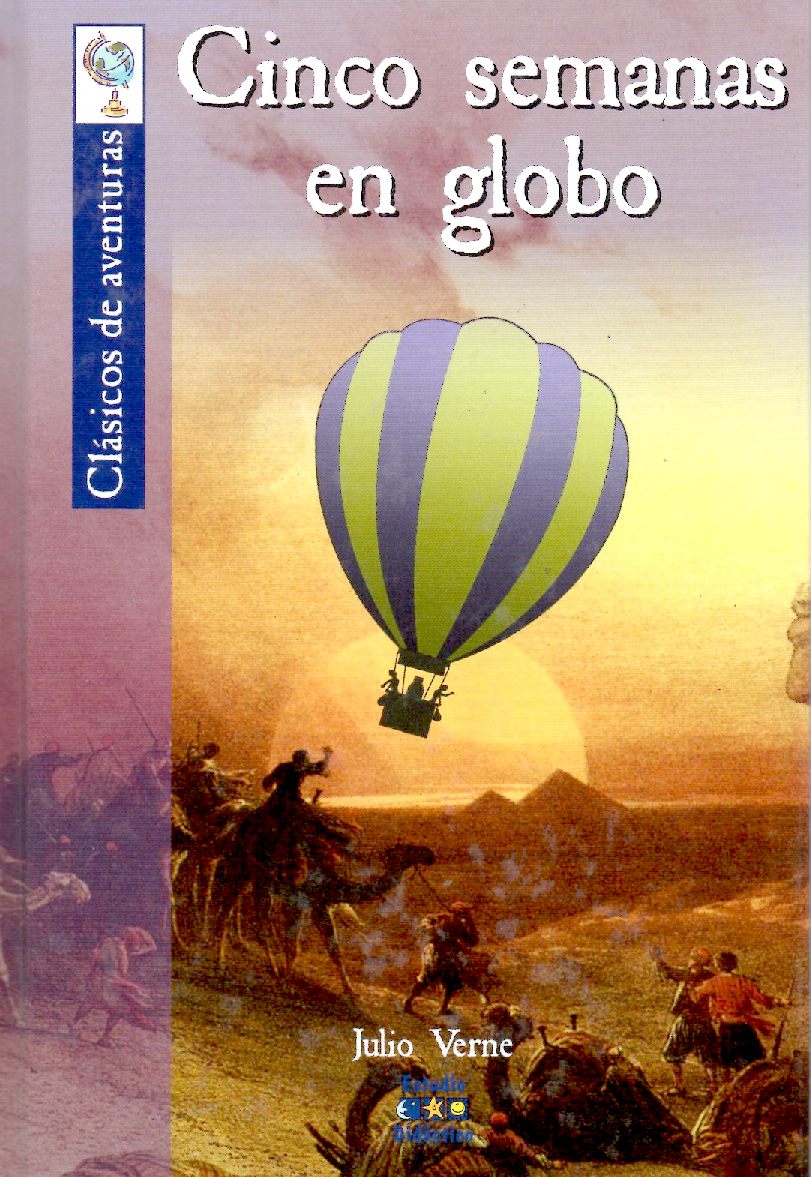
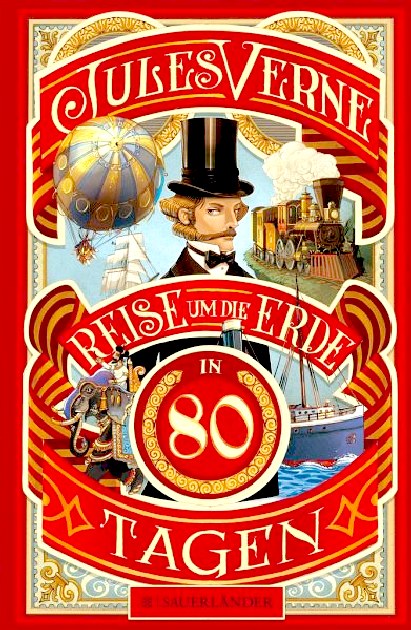
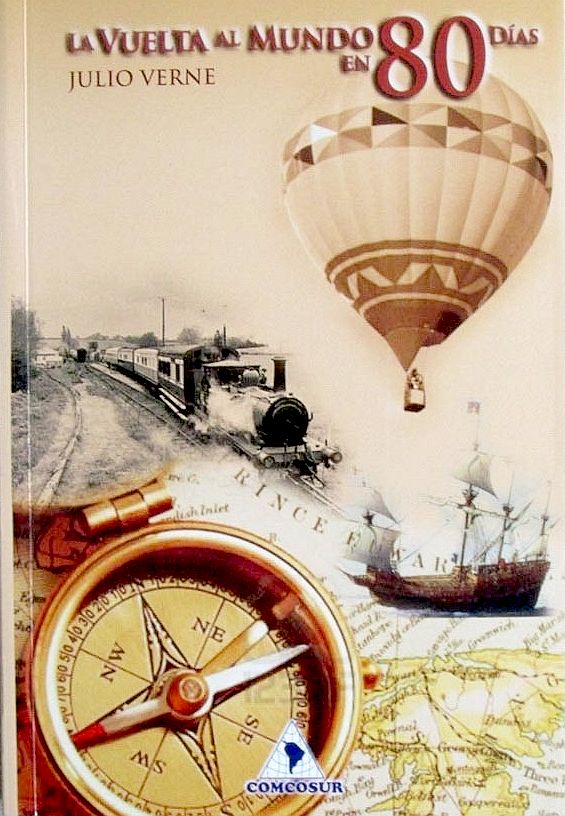

Many
of his stories today seem a little tame, as technology has caught up
with the imagination of the extraordinary French author, and Hollywood
has discovered Computer Generated Images (CGI) allowing super heroes to
grace our screens as never before. Computers are one thing that Verne
did not imagine or seek to portray.
Beginning in late 1872, the serialized version of Verne's famed Around the World in Eighty Days (Le Tour du monde en quatre-vingts jours) first appeared in print. The story of Phileas Fogg and Jean Passepartout takes readers on an adventurous global tour at a time when travel was becoming easier and alluring. In the century plus since its original debut, the work has been adapted for the theater, radio, television and film, including the classic 1956 version starring David
Niven. The TV series starring Pierce Brosnan released in 1989, runs for around 6 hours on
2 DVDs. A BBC
TV travel documentary starring Michael Palin, was also screened in
1989. A second TV series starring David Tennant was produced by the
BBC for 2021.
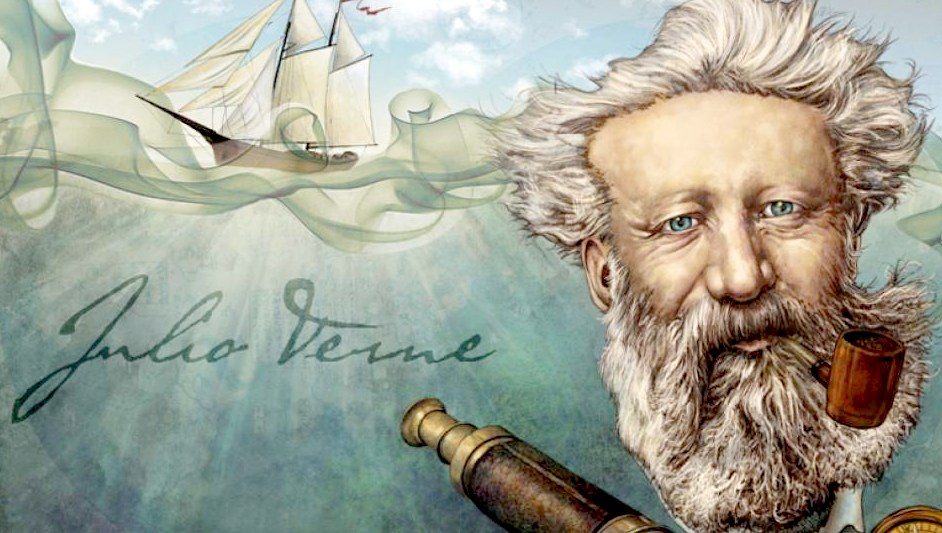
Jules
Verne is known as the Father of Science Fiction
Where
Jules Verne's suggested that it might be possible to travel Around The
World In 80 Days, we would like to extend that ethos to include
traveling in a Zero
Emission yacht (ZEWT or ZEV) driven by electric
hydro-jets? With the advent of solar power and liquid
hydrogen, it is a distinct possibility - on a scale of the wager
that the legendary Philleas Fogg entered into at the Reform Club in
1872.
|







